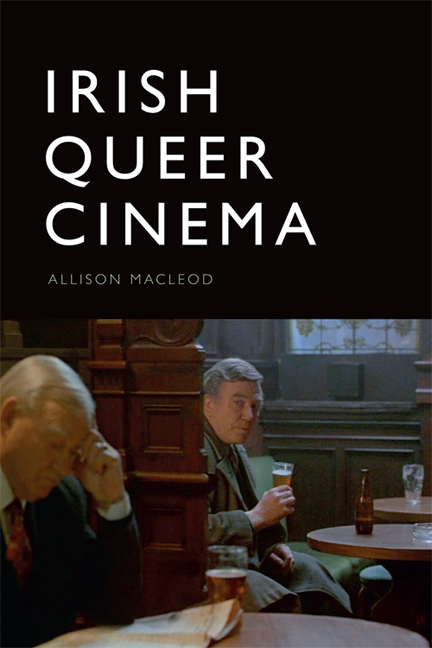Book contents
- Frontmatter
- Contents
- List of Figures
- Acknowledgements
- 1 Queerly National and Nationally Queer: Paradoxes of an Irish Queer Cinema
- 2 Mapping Ireland’s Queer Films
- 3 Re-imagined Kinship and Failed Communities
- 4 The Contested Space of the Irish Pub
- 5 Compartmentalised Cosmopolitans and Rigid Fluidity
- 6 The Queerly Productive Constraints of Rural Space
- 7 Queer Mobilities and Disassociated Masculinities
- 8 Contested Belongings within Diasporic Space
- 9 The Irish Queer Short Film
- 10 Concluding Remarks
- Select Filmography
- Bibliography
- Index
2 - Mapping Ireland’s Queer Films
Published online by Cambridge University Press: 04 May 2021
- Frontmatter
- Contents
- List of Figures
- Acknowledgements
- 1 Queerly National and Nationally Queer: Paradoxes of an Irish Queer Cinema
- 2 Mapping Ireland’s Queer Films
- 3 Re-imagined Kinship and Failed Communities
- 4 The Contested Space of the Irish Pub
- 5 Compartmentalised Cosmopolitans and Rigid Fluidity
- 6 The Queerly Productive Constraints of Rural Space
- 7 Queer Mobilities and Disassociated Masculinities
- 8 Contested Belongings within Diasporic Space
- 9 The Irish Queer Short Film
- 10 Concluding Remarks
- Select Filmography
- Bibliography
- Index
Summary
This chapter provides a historical context for the following case study chapters. It frames individual films in relation to significant developments and debates shaping Irish society and the Irish film industry, mapping out Irish queer cinema against three different periods of indigenous filmmaking in Ireland: the First Wave, Celtic Tiger and post-Celtic Tiger. In doing so, it establishes the parameters for this study of Irish queer cinema whilst outlining the rationalisation for and value of considering these films as Irish.
Discussions of national cinema generally define it in terms of its ability to express a distinct national culture and are based on the premise that the national origin of a film is a unique marker. The concept of national cinema has been undermined by critics who argue that it assumes a homogenous and stable national community that in turn obscures cultural diversity and transnational forms of belonging. Yet this book argues for the potential of a national cinema to reveal the inconsistencies and incoherencies that underlie the discursive construction of the nation. Aligning itself with approaches to national cinema taken by Tom O’Regan (1996) and Susan Hayward (2000), it explores how Irish queer films affect and are an effect of ‘the way in which society as a national whole is problematized and the kind of nation that has been projected through such problematization’ (O’Regan quoted in Hayward 2000: 93). Rather than using the national to imply a coherent and cohesive whole, it becomes a tool for examining how films situate Irish queer stories, identities, spaces and themes in relation to local, transnational and global processes.
In 1992 perhaps one of the most internationally recognised Irish queer films, The Crying Game (Jordan 1992), was released to critical acclaim. Centred on a love triangle between IRA member Fergus (Stephen Rea), black British transgender hairdresser Dil (Jaye Davidson) and Antiguan black British soldier Jody (Forest Whitaker), the film plays out anxieties surrounding nationalism, the Irish/British relationship and race through the subversion of norms surrounding masculinity and sexuality. The Crying Game garnered high levels of visibility on the international festival circuit and was nominated for six Academy Awards, winning one for Best Screenplay. It also helped to invigorate the Irish film industry, with its international success helping to relaunch the IFB in 1993.
- Type
- Chapter
- Information
- Irish Queer Cinema , pp. 18 - 27Publisher: Edinburgh University PressPrint publication year: 2018



